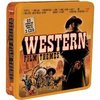Soundtrack Information
Music From
Music By
Purchase Soundtrack
Track Listing
| 1. | Slow Water | |
| 2. | Song Of '70 | |
| 3. | Heaven's Gate Waltz | |
| 4. | Snowfall | |
| 5. | Blue Danube | |
| 6. | Battle Hymn | |
| 7. | Ella's Waltz | |
| 8. | Sweet Breeze | |
| 9. | Mamou Two Step | |
| 10. | Moonlight | |
| 11. | Morning Star | |
| 12. | Village Dance | |
| 13. | The Long Road | |
| 14. | Overture | |
| 15. | Immigrant Road | |
| 16. | Meeting Billy | |
| 17. | Baby's Song | |
| 18. | Slow Water Reprised | |
| 19. | Intermission | |
| 20. | Playing In The Barn | |
| 21. | Champion's Death | |
| 22. | The People Revolt | |
| 23. | Ella's Death | |
| 24. | The Yacht | |
| 25. | End Credits | |
| Track lengths not available for this album. If you have track length/time information for this album, please e-mail it to us at mail@soundtrack.net and we will add it to the database. | ||
Related Albums

The Wild West - The Essential Western Film Music CollectionSilva America (SSD-1099)
Released: September 21, 1999
Formats: CD, Digital (141 min)
Review: Heaven's Gate
4.5 / 5 Stars
Many reasons for the critical backlash against Cimino was for his massive budget overruns and the amount of time and fuss spent tuning the film to his vision. The film’s length was also an issue, running a bit over three hours, a stretch for many audiences in the early 1980s. The film had an amazing cast that contained the likes of Kris Kristofferson, Christopher Walken, John Hurt, Sam Waterston, Brad Dourif, and Jeff Bridges in one of his first film roles. I tried watching it twice but I’d have to say that the length and pace of the film was a bit to slow for my taste. It was beautifully shot, one of the few truly cinematic gems in America’s library of film. This film did pave the way for historically based movies such as Wyatt Earp, Gettysburg and Braveheart, each of which have their uncut running time nearing or over three hours. Granted the somewhat unwarranted backlash only allowed these films to be made after about a decade and a half, quite a long time in Hollywood.
The score is great. One of the few films of the past twenty years where the music written fits so well into the film that it ads true credibility and a sense realism to the story. The band, used for music not played by Mansfield himself, was comprised of a rather esteemed group of musicians. These folks included famed record producer/musician T-Bone Burnett and some members of actor Kris Kristofferson’s own band. To add a further level of realism, they also portrayed the band seen in the film’s dance hall and other sequences.
As mentioned in the liner notes, and which can be detected through just casual listening, the music’s source themes were derived from eastern-European folk music and work songs. Some of those songs can be heard in the film sung by various characters, but unfortunately they do not appear on this album as source cues. Some of the themes are also derived from traditional American music as well as, for the dance hall sequence, Strauss’ "The Blue Danube."
The theme that David Mansfield composed fits well as a ballad or when played as a waltz, a kind of multipurpose piece of music. It makes casual appearances throughout the 25 tracks on this release, less obnoxious that themes developed for similar films and more integrated into the entire feel of the film, texturing the time and setting of the film. I would highly recommend this score to just about anyone who likes film scores due to its difference to the average music written for films today, a true departure from the norm. It’s also great to note that Ryko continues their excellent issues of MGM film scores, and on this release marks one of their non-fold out inserts. This is a pleasure considering the map folding skills required to negotiate some of their earlier releases.
-
Click stars
to rate.
If any information appears to be missing from this page, contact us and let us know!


